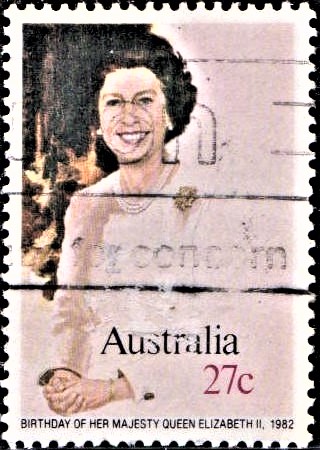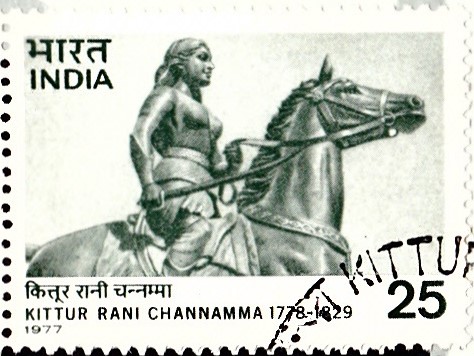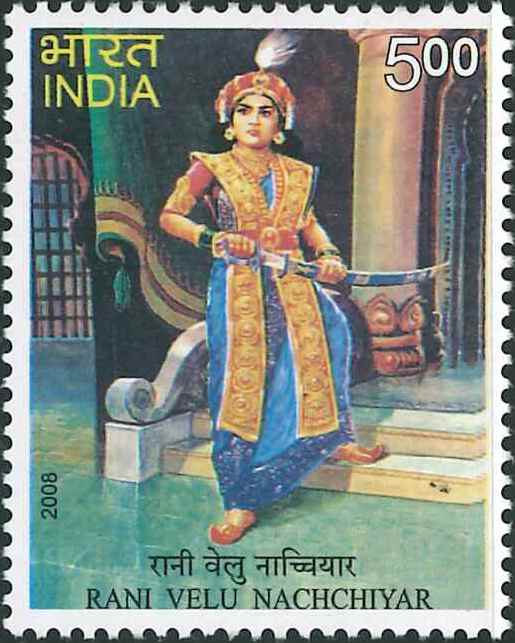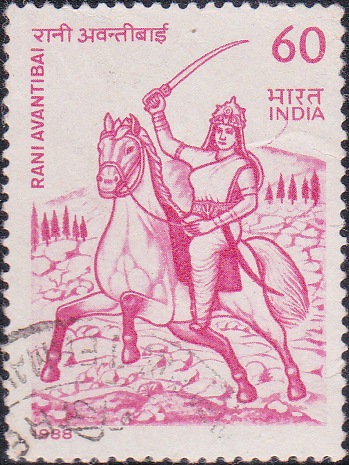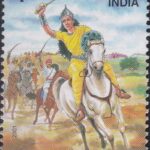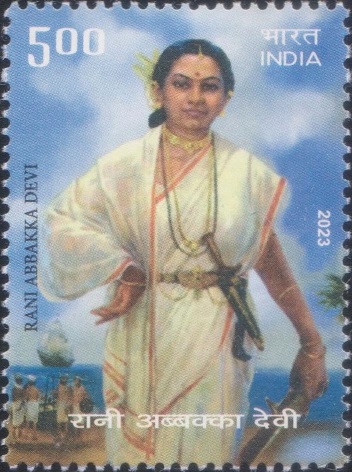
Rani Abbakka Devi
A commemorative postage stamp on Queen Abbakka Chowta, Tuluva Queens (mother-daughter) of Ullal (Karnataka) from Chowta dynasty, who both fought and defeated the Portuguese :
 Issued by India
Issued by India
Issued on Dec 15, 2023
Issued for : Department of Posts is pleased to issue Commemorative Postage Stamp on Rani Abbakka Devi and salutes her valour and bravery, an everlasting inspiration for every Indian.
Credits :
Stamp/FDC/Brochure/Cancellation Cachet : Smt. Vinita Sinha
Type : Stamp, Mint Condition
Colour : Multi Colour
Denomination : 500 Paise
Stamps Printed : 303200
Printing Process : Wet Offset
Printer : Security Printing Press, Hyderabad
About :
- Due to the entry of the Portuguese in the 16th century, Tulunadu became a hotbed of unrest. When more than fourteen sub dynasties like the Bangas, Ajilas, Chautas, Sawantas, were engaged in conflict amongst themselves. It then inevitable that they had to fight against the Europeans as well. The political centres of the Banga dynasty were Belthangady, Uppinangady, Nanadvara and Mangalore, and the Chautas were Ullala, Puttige and Mudabidre region. These dynasties belonged to the Jain community. The Chautas of Ullal rose to power during the 12th century.
- The names of elder Rani Abbakka Devi (1554-1588) and younger Rani Abbakka Devi (1594-1640) shine like the brightest stars in Indian history. The elder Rani Abbakka Devi was married to Kamaraya II, and her daughter, the younger Rani Abbakka Devi was married to Lakshmappa Bangarasa, the IV. Both Kamaraya and Lakshmappa belonged to the Banga dynasty. The mother-daughter duo held great expertise in warfare and other state crafts and were popular amongst their subjects. When the Banga dynasty succumbed to the Portuguese rule and was prepared to pay tribute, the elder Rani Abbakka Devi opposed it. Elder Rani Abbakka Devi resisted the Portuguese until her last breath, while the younger Rani Abbakka Devi continued her mother’s revenge and fulfilled her mother’s dreams.
- The difference of opinion between the Lakshamappa Bangarasa and Younger Abbakka on payment of tribute to the Portuguese increased to such an extent that she left the Palace of her husband in Mangalore with her three children and assumed the throne at Ullal, inherited from her mother. She was ready to face Portuguese in war than to offer them tribute.
- The war continued for a long time. In 1617, when the Portuguese looted a merchant ship of Abbakka, enroute to Saudi Arabia, she was gravely enraged. This incident led to the great war against the Portuguese in 1618. Abbakka got the help of Venkatappa Nayaka of Keladi, who also saw the Portuguese and the Bangas as his enemy. The Portuguese Navy, which had an excellent reputation internationally, was destroyed by Rani Abbakka with her meagre military force in her war against the Portuguese in 1618. In this war, Portuguese military leaders Miranda and D’Mello narrowly escaped.
- This news spread like wildfire in Europe. More or less, after this incident, the coastal belt was freed from Portuguese interference.
- As suggested by Shah Abbas, the king of Persia, Italian traveller Pietro Dalla Valle came to Ullal in 1623 to meet Rani Abbakka. He gets inspired by his meeting with the queen in Manel. His description of this exceptional meet can be found in his travelogue. Had Rani Abbakka not defeated the Portuguese with her skilled war tactics, the possibility of the Portuguese ruling India instead of the Britishers had a high chance.
- Rani Abbakka was as well known for her war tactics and state crafts as her love towards her subjects, governance and justice. Such an extraordinarily brave woman who belongs to the Tuluva soil is a matter of great pride to the entire nation. Despite being the queen of a small province like Ullala, she dared to erupt against the European forces and defeat the Portuguese. Hence, it is only apt to say that Braveheart is the first Indian freedom fighter to fight against the European powers.
- The Portuguese had made several attempts to capture Ullal, strategically placed. But Abbakka had repulsed each of their attack with sheer courage and ingenuity. The queen’s story is retold from generation to generation through folk songs and yakshagana, the popular folk theatre, In bootaradhana, (which literally means appeasing the possessed, a local ritual dance) the personal in trance narrates the great deeds of Abbakka Devi. Abbakka, dark and good looking, always dressed in simple clothes like a common village woman. She rode the horse stately and worked deep into the night dispensing justice.
- Rani Abbakka, though a Queen of a little known small princely state, Ullal, was magnetic woman of indomitable courage and patriotism. While Rani Jhansi has become a symbol of courage, Abbakka, nearly 300 years her predecessor, has been largely forgotten by history. Available records and archives speaks of her as a luminous personality of awesome valour and bravery.
- Text : Based on information received from proponent.
Subscribe
Login
0 Comments
Oldest



